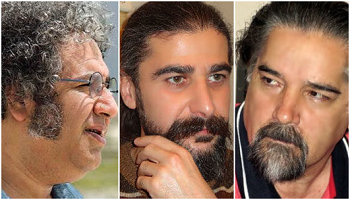
On Saturday, September 26, 2020, Baktash Abtin, Reza Khandan Mahabadi, and Keyvan Bajan, three members of the Writers’ Association of Iran, were summoned to the Evin Prison Prosecutor’s Office on Saturday and transferred to evin prison to serve their sentences.
These three have been convicted to a total of 15 years and 6 months in prison by the appeal court.
The charges brought against these three witers were “propaganda against the regime” and “gathering and collusion with the intention of acting against national security”. The cited proofs of these charges were membership in the the Writers’ Association (Kanoon), publication of internal statements and newsletters of the Kanoon, visiting the graves of the victims of the infamous “serial murders”, i.e. Ja’far Puyandeh and Mohammad Mokhtari, and attending the memorial service of Ahmad Shamloo.
The Writers’ Association of Iran had previously called these sentences “an insult of justice” and said that they are punished for opposing censorship and defending freedom of expression.
“At a time when the new wave of coronavirus in the country takes hundreds of victims daily and the lack of health facilities in prisons can have disastrous consequences, imprisoning these three writers and others charged for their ideological and political views makes no sense other than that the security and judicial authorities want to send protesters and dissidents to the altar,” the Writers’ Association of Iran said in a statement released on Sunday.
In January 2019, Baktash Abtin and Reza Khandan Mahabadi were each sentenced to six years and Keyvan Bajan to three years and six months imprisonment.
The three writers have been tried in connection with a case opened for them by the Intelligence Ministry of Hassan Rouhani’s government in 2015.
The Writers’ Association of Iran has written that in the past years it has “always witnessed the arrest and harassment of its members, and has lost several members during the political murders of the 1990s” and that “the rulers of the Islamic Republic, the judiciary, and the Ministry of Intelligence are responsible for protecting the lives and health of the detained members of Kanoon.”
The Writers’ Association of Iran condemned the sentences and said, “This is not just the trial and conviction of three writers. This is not the only trial of the Writers’ Association of Iran. It is the condemnation of all writers and those who want the right to freedom of expression.”
It also called the “reasons and evidences of the court” for these charges “more irrelevant and looser than the charges themselves.”
The World Pen Association has also objected to these sentences when they were announced.
In its new statement, the Writers’ Association of Iran (Kanoon) called on “writers, human rights organizations, and the freedom-seeking people of Iran” to react to these “inhumane sentences.”
About the Writers Association of Iran (Kanoon)
The Writers’ Association of Iran was founded in May 1968.
Simin Daneshvar, Mahmoud Etemadzadeh (Beh-Azin), Nader Naderpour, Siavash Kasrai, Dariush Ashouri, Esmaeil Khoei, and Ahmad Shamloo were among the first members of the board of directors.
During the reign of Mohammad Reza Pahlavi and during the Islamic Republic, the activities of the Writers’ Association have been restricted and its members have been under pressure from the government.
A number of members of the Writers’ Association of Iran were executed after the 79 revolution, and in the 1990s, several of them were killed, which proved the role of Intelligence Ministry agents in their murders in the case of Mohammad Mokhtari and Mohammad Ja’far Puyandeh.












 Posted in
Posted in 











